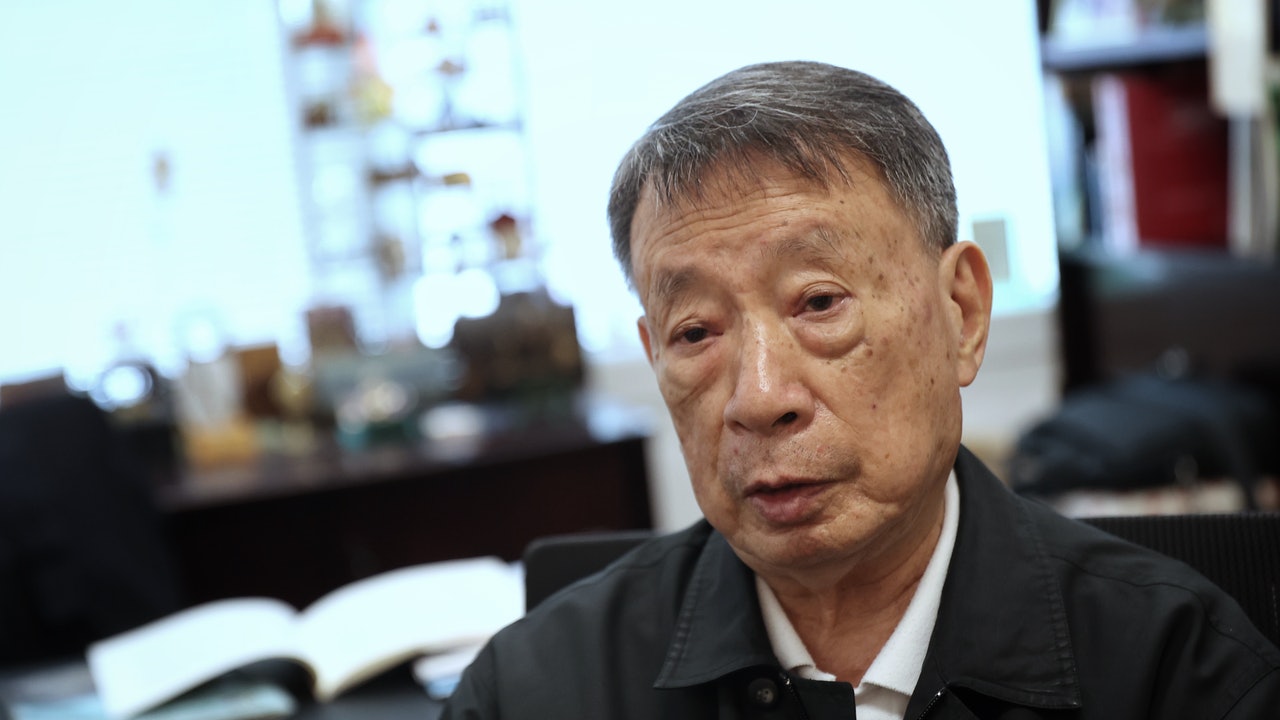At the end of the five-year term of Chief Executive Carrie Lam, the latest annual social welfare expenditure budget is 111.8 billion yuan, a 71% increase from the beginning of her tenure.
However, as much as 40% of this expenditure is actually used for cash benefits for the elderly, three-quarters is invested in the "Old Living Allowance", and the rest is the elderly CSSA and "fruit money". ─ "Universal Refund".
To see this set of figures clearly, Zhou Yongxin, an emeritus professor at the University of Hong Kong, is the best starting point.
Carrie Lam was the Chief Secretary for Administration in the previous government and began to take charge of the issue of "surrender of insurance". In 2013, Zhou Yongxin was entrusted by her to carry out research and finally proposed a monthly pension of 3,000 yuan, which is "exempt from examination and unified for all people". , but the plan was overturned with overwhelming public support, and the government adopted the method of optimizing the "Changshengjin" to implement the "surrender".
The difference is that the former includes a financing plan for the introduction of an old age tax, while the latter is solely borne by public funds.
This decision has laid the foundation for social welfare spending to exceed 100 billion yuan every year. Is it considered a political achievement?
It depends on the financial sustainability in the long run.
In an exclusive interview with "Hong Kong 01", Zhou Yongxin believed that Lam's decision on that day left a financial unsustainable tail, and the government must make a decision after five years at the latest, otherwise the financial crisis will accompany the social welfare expenditure will continue to increase.
After deducting cash benefits for the elderly, the annual social welfare expenditure exceeds 100 billion, and there is no real improvement in other areas.
Zhou pointed out that the "universal surrender" was killed because of the introduction of new taxes and the positioning of "civil rights". It reflects Hong Kong's traditional governance thinking and the interests of the business community. They are two mountains that hinder the reform of people's livelihood. Understanding capitalism: "If the law stays in the Hong Kong-British era, what about the implementation of 'one country, two systems'?"
40% is used for elderly welfare funds, which cannot be supported by long-term finance alone
As early as 1983, Zhou Yongxin was recruited by the British Hong Kong government to join the advisory committee. He has provided suggestions for social welfare for 40 years, but because of the "surrender" campaign, he has become synonymous with "disposal".
He had hoped that the "surrender" dispute would end in the hands of Carrie Lam, but in the end it fell through. Zhou Xiaoxiao said that over the years, he has spoken to the government and encountered obstacles, so there is no "anger or anger", but only the "numerical illusion".
He said there is no doubt that social welfare expenditure during Lam Cheng’s tenure replaced education as the largest recurring expenditure, but if you look carefully, you will find that an increase in the whole expenditure does not mean that all services have improved, because as many as 30% of the expenditure Put it into "Changshengjin".
"Changshengjin" was launched at the end of 2012 before the surrender consultation. It was regarded as a transitional measure before the implementation of "universal surrender", with income and asset restrictions; Zhou Yongxin completed the "surrender" study after two years as entrusted by the government. It is proposed to replace it with a "universal old age pension", with a one-off injection of 50 billion yuan from the government and the introduction of an old age tax that is shared by both employers and employees.
Without increasing the burden on the government, "everyone has a share", whether rich or poor, but the plan was overturned by the government on the grounds that it was "financially unfeasible".
Afterwards, the government added a layer of "high" allowance on the basis of "longevity allowance" to demonstrate its commitment to the elderly. Elderly people with less assets can receive an additional $1,000 per month, increasing to about $3,600. Two levels "Changshengjin" has become a surrender plan for "financial needs".
10 days before his departure from office and at the beginning of this week (20th), Carrie Lam announced the "virtue policy" again, and the "Changshengjin" will be merged from September 1, and unified into "high", 3,915 yuan per month; the application threshold will be relaxed , Taking one elderly person as an example, the monthly income cannot be more than 10,430 yuan, and the asset limit is 374,000 yuan.
Number of claimants for Tier 3 Elderly Welfare: Elderly CSSA: 122,436 Old Age Living Allowance: 638,462 Old Age Allowance: 313,129 *Currently, there are nearly 1.5 million people aged 65 or above in Hong Kong, and about 70% are applying for various types of elderly welfare.
In 2021, Hong Kong's elderly population will reach 20.5%, which is a "super-aging society"; according to the Planning Department's projections, the proportion of elderly population will rise to 30% in 2040.
Social Welfare Department data
Zhou Yongxin.
(Photo by Li Zetong)
"Changshengjin" is financially unsustainable and misses the opportunity to introduce new taxes
Zhou Yongxin said that together with the "fruit money" and the elderly CSSA, a three-tier elderly welfare system has been formed.
Two months later, as many as 640,000 seniors will "pay" about 4,000 yuan per month in the warehouse, accounting for 42% of the population over the age of 65; the overall number of seniors benefiting from the three-tier welfare system will increase to more than 1.07 million People are not far from being "all people", which is also the main reason for the surge in social welfare spending.
However, he said that this "political achievement" will inevitably pose a financial concern in the long run, stemming from the government's "miscalculation" to overturn the "old-age pension" plan with financing arrangements.
Zhou Yongxin explained that the team formulated the "universal retirement insurance" plan from the perspective of "civil rights": "But the government always felt that the "refunding" should be a "poverty alleviation" measure, and the people in financial need should be helped." He said The government has been implementing the golden rule of "not changing the current tax system" for decades: "Financial officials ignore our proposal to levy an old-age tax, because the government has to pay for everything, so (the national plan) is not financially feasible. So simple." The tepid Zhou Yongxin always recounted his past encounters with officials with a faint smile.
Over the decades, I have dealt with financial officials many times. Sometimes I feel helpless and do a lot of wild things. In the end, I heard the sentence "resources are not unlimited" every day.
I know enough, wash what you are talking about, the resources will not be unlimited, and the money will not fall when you talk every day, it's really hard work!
As an official, you have to think about getting money.
"Should be washed and washed", the Financial Secretary has been talking all day long, what is it that should be washed and washed?
Zhou Yongxin
Binding oneself with the old governance thinking
The "All People" plan overturned the management philosophy of the world's freest economy and was eventually overturned. Zhou pointed out that the government chose to replace it with "Changshengjin", which has income and asset limits. Compressing the number of applicants, the official estimate at that time was 300,000 people, but he pointed out that "people with a discerning eye will know what they are saying when they hear it." After that, as expected, the applicants quickly exceeded the estimate, and public opinion had already warned that there would be a transfer of the elderly. The phenomenon of assets "evading censorship", but the government "knows that there is a problem and takes care of it."
He pointed out that, just like the Octopus for the Elderly, it was impossible to foresee that it would be abused at the beginning of its implementation. "Do you check one by one at the gate? Yijiami is going to reverse the business and go back to the real-name system." , disturbing the people, and the government will also be questioned whether it has "care" for the elderly.
“Changsheng Jin” is the same. If it is not optimized for five years, the financial difficulties will only become more and more difficult: “One is to introduce taxes, the other is to tighten the (application) threshold, and limit the amount of allowance to the same number of people, but it is expected that At this point, he can only hope that in the future, the government will make improvements without harming the grassroots, and consider imposing an old age pension tax, or adjusting the property tax to increase revenue.
Zhou Yongxin hopes that in the future, the government will optimize the "Longsheng Jin" without harming the grassroots.
(File photo/Photo by Lin Ruoqin)
Critic that Lam Cheng has not done any other social welfare services except the elderly welfare fund
Zhou Yongxin pointed out that in fact, the annual social welfare expenditure of more than 100 billion yuan has only been invested in more than 60 billion yuan in other areas, excluding cash benefits for the elderly. "Actually, it is unable to catch up with the demand. It’s no different from 20 years ago!” The fifth wave of the epidemic, the tragic situation of nursing homes for the elderly is even more evident: “Of course, he keeps talking about adding hundreds of more nursing and elderly places every year, but the population is aging, and the demand increases with age. It is constantly increasing, and every service is adding a little or a little, but I can’t talk about whether it can actually improve.” He said that in various social welfare areas, Lam Cheng could not keep up with the demand during his tenure, and the progress was as slow as the past 25 years. .
"The government has to think about it at this stage, and all the money can be borne alone!" Zhou Yongxin pointed out, taking the improvement of the environment of the institutions as an example, if the government undertakes it alone, it will often cost hundreds to 20 billion yuan every year. Why not consider imitating others Does the country introduce "long-term care insurance"?
He pointed out that the government must have an exceptional financial management concept and governance thinking. "Financial officials have been saying at the end of the day, 'Do it if it makes sense financially, if it doesn't work, don't do it.' The impact on the life of the people is purely a matter of thinking about themselves.” He pointed out that under the operation of the bureaucracy, fiscal discipline is based on revenue and expenditure.
Capitalism must change with the times, and fiscal discipline cannot be adhered to
Another "mountain" that stands in the way is the interests of the business community. At the time, Zhou Yongxin proposed an improvement plan, which would be borne by the government, but the threshold for applying for the "universal old age pension" was raised to 70 years old, which reduced the number of beneficiaries and could only support a few financially. year.
He pointed out that the business community does not agree that Hong Kong should have welfare at all: "I feel that Hong Kong is not a welfare state all the time. In a word, it is said that more taxes and more money should be added, so I oppose it, and don't change my thinking!"
Zhou Yongxin pointed out that the "Basic Law" clearly states that the capitalist system "will remain unchanged for fifty years", but the concept will change with the changes of the times; Article 107 requires the government to "live within its means, strive to balance revenue and expenditure, and avoid deficits." It's a matter of principle, not to ask you to stick to it."
He pointed out that if the "big mountain" is not broken, it is difficult to expect substantial changes in the welfare and people's livelihood policy.
Hong Kong has progressed to a stage where it can no longer use the concepts of the Hong Kong-British era to solve people's livelihood issues.
In essence, the government does not agree with raising taxes to maintain the system, and they also feel that a system that is universal and not limited to assets is unacceptable, and they think that resources should be concentrated to help those in financial need.
The perception of Hong Kong's capitalist system remains in the Hong Kong-British era. How can we implement "one country, two systems"?
Zhou Yongxin
He had hoped for Lam Cheng and sent a message to Li Jiachao not to take all decisions and implementation
This 40-year "universal retirement" campaign has not seen its end. Zhou Yongxin said that although he is used to bureaucracy, he did have expectations for Carrie Lam: "As the director of the Social Security Administration and the permanent secretary of civil affairs, I have had a lot of contact, and I have fallen all the way. To this day, I think he is a very diligent person, and I really want to be a wild man. Or I had hope at the time that he would be able to change the way the government has always been thinking." But in the end, history handed over Not as popular as the answer.
Zhou Yongxin, known as the "Father of Social Work", has played against the previous special capitals, and was asked which Chief Executive has the most unusual style?
He did not name two or three chief executives. When he heard his suggestion to change his thinking on governance, he would point out the Basic Law and worry about whether it would violate the provisions. Tsang, who believed in the "invisible hand", even went "completely backward": "I don't think at all. It is easiest for the government to be unruly, the market to expose the problem, and the problem will be solved by itself.” And Tung Chee-hwa has the most vision, for example, “85,000”, the proportion of post-secondary education, and mother tongue education have all put forward ideas, but they are subject to administrative officials. resistance.
Zhou Yongxin said that it is difficult to comment on the chief executive-designate Li Jiachao at this moment, but he hopes that he can break through the old governance thinking and obstacles, and also avoid the practice of the chief executive under the leadership of Carrie Lam.
He pointed out that the chief executive only has to put forward a vision, make a decision, and then execute it by his subordinates.
Inventory of Lam Cheng’s walks | Archives Law, Independent Review of Amendment Laws No Shadow Poverty alleviation: MPs urge financial aid to Africa to "really get rid of poverty"










/cloudfront-eu-central-1.images.arcpublishing.com/prisa/KMEYMJKESBAZBE4MRBAM4TGHIQ.jpg)


